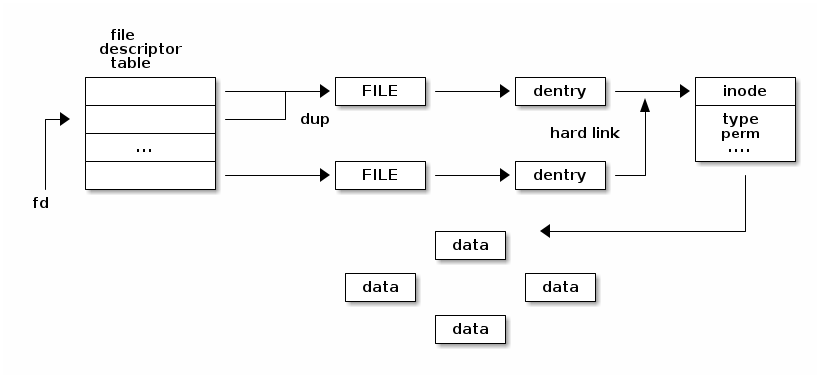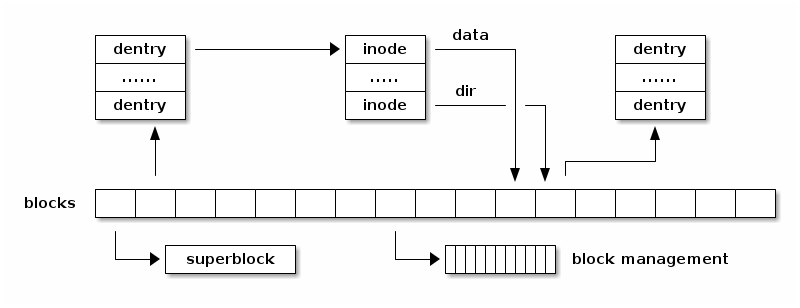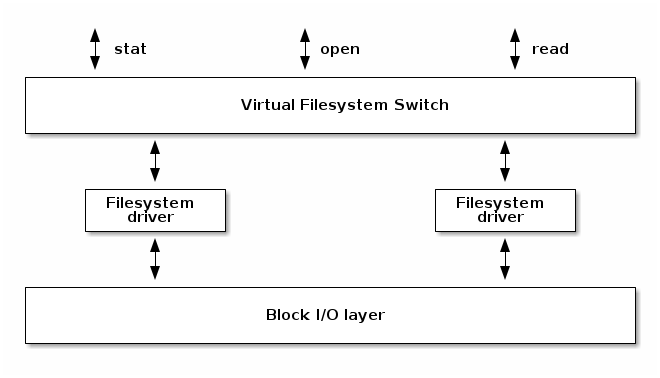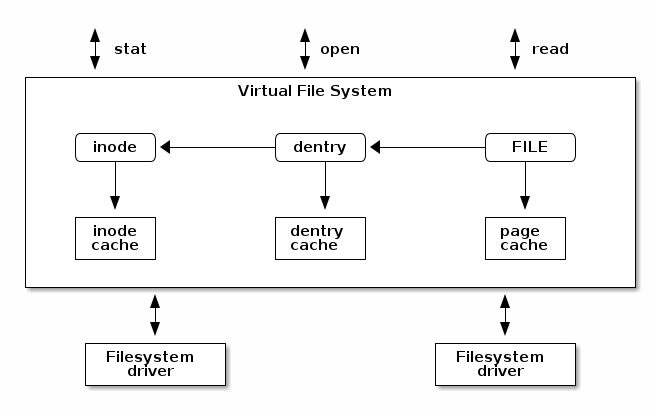文件系统管理
- 文件系统抽象
- 文件系统操作
- Linux VFS
- Linux I/O 管理概述
文件系统抽象
- 超级块(superblock)
- 文件(file)
- 索引节点(inode)
- 目录项(dentry)
文件系统抽象——在内存中

文件系统抽象——在存储中

简易文件系统示例

概览

文件系统操作
- 挂载
- 打开文件
- 查询文件属性
- 从文件读取数据
- 将数据写入文件
- 创建文件
- 删除文件
挂载文件系统
- 输入:存储设备(分区)
- 输出:指向根目录的 dentry
- 步骤:检查设备,确定文件系统参数,定位根 inode
- 示例:检查魔数,确定块大小,读取根 inode 并创建 dentry
打开文件
- 输入:路径
- 输出:文件描述符
- 步骤:
- 确定文件系统类型
- 对于路径中的每个名称:查找父级 dentry,加载 inode,加载数据,找到 dentry
- 创建指向最后一个 dentry 的新的 file
- 在文件描述符表中找到一个空闲条目,并将其设置为 file
查询文件属性
- 输入:路径
- 输出:文件属性
- 步骤:
- 访问 file->dentry->inode
- 从 inode 中读取文件属性
从文件读取数据
- 输入:文件描述符、偏移量、长度
- 输出:数据
- 步骤:
- 访问 file->dentry->inode
- 确定数据块
- 将数据块复制到内存中
向文件写入数据
- 输入:文件描述符、偏移量、长度、数据
- 输出:
- 步骤:
- 分配一个或多个数据块
- 将分配的块添加到 inode 中并更新文件大小
- 将数据从用户空间复制到内部缓冲区,并将其写入存储
关闭文件
- 输入:文件描述符
- 输出:
- 步骤:
- 将文件描述符条目设置为 NULL
- 减少文件引用计数器
- 当计数器达到 0 时释放 file
目录
目录是包含一个或多个 dentry 的特殊文件。
创建文件
- 输入:路径
- 输出:
- 步骤:
- 确定 inode 目录
- 读取数据块并为新 dentry 找到空间
- 写回修改后的 inode 目录数据块
删除文件
- 输入:路径
- 输出:
- 步骤:
- 确定父级 inode
- 读取父级 inode 数据块
- 查找并删除 dentry(检查链接)
- 当最后一个 file 关闭时:释放数据块和 inode 块
虚拟文件系统

超级块操作
|
|
Inode 操作
|
|
Inode 缓存
- 将 inode 缓存到内存中,以避免昂贵的存储操作
- inode 被缓存,直到触发低内存条件
- inode 使用哈希表进行索引
- inode 哈希函数以超级块和 inode 号作为输入
目录项缓存
- 状态:
- 已使用——d_inode 有效且 dentry 对象正在使用中
- 未使用——d_inode 有效,但 dentry 对象未在使用中
- 负——d_inode 无效;尚未加载 inode 或文件已被删除
- 目录项缓存
- 已使用的目录项列表(dentry->d_state == used)
- 最近使用的目录项列表(按访问时间排序)
- 哈希表以避免搜索树
页面缓存
- 缓存文件数据而非块设备数据
- 使用
struct address_space将文件偏移转换为块偏移 - 用于 read / write 和 mmap
- 使用基数树(radix tree)
struct address_space
/**
* struct address_space——可缓存、可映射对象的内容。
* @host: 所有者,可以是 inode 或 block_device。
* @i_pages: 缓存的页面。
* @gfp_mask: 用于分配页面的内存分配标志。
* @i_mmap_writable: VM_SHARED 映射的数量。
* @nr_thps: 页面缓存中的 THP 数量(仅用于非 shmem)。
* @i_mmap: 私有和共享映射的树。
* @i_mmap_rwsem: 保护 @i_mmap 和 @i_mmap_writable。
* @nrpages: 页面条目的数量,由 i_pages 锁保护。
* @nrexceptional: 阴影或 DAX 条目,由 i_pages 锁保护。
* @writeback_index: 写回的起始位置。
* @a_ops: 方法。
* @flags: 错误位和标志(AS_*)。
* @wb_err: 最近发生的错误。
* @private_lock: 由 address_space 所有者使用。
* @private_list: 由 address_space 所有者使用。
* @private_data: 由 address_space 所有者使用。
*/
struct address_space {
struct inode *host;
struct xarray i_pages;
gfp_t gfp_mask;
atomic_t i_mmap_writable;
#ifdef CONFIG_READ_ONLY_THP_FOR_FS
/* number of thp, only for non-shmem files */
atomic_t nr_thps;
#endif
struct rb_root_cached i_mmap;
struct rw_semaphore i_mmap_rwsem;
unsigned long nrpages;
unsigned long nrexceptional;
pgoff_t writeback_index;
const struct address_space_operations *a_ops;
unsigned long flags;
errseq_t wb_err;
spinlock_t private_lock;
struct list_head private_list;
void *private_data;
} __attribute__((aligned(sizeof(long)))) __randomize_layout;
struct address_space_operations {
int (*writepage)(struct page *page, struct writeback_control *wbc);
int (*readpage)(struct file *, struct page *);
/* Write back some dirty pages from this mapping. */
int (*writepages)(struct address_space *, struct writeback_control *);
/* Set a page dirty. Return true if this dirtied it */
int (*set_page_dirty)(struct page *page);
/*
* Reads in the requested pages. Unlike ->readpage(), this is
* PURELY used for read-ahead!.
*/
int (*readpages)(struct file *filp, struct address_space *mapping,
struct list_head *pages, unsigned nr_pages);
void (*readahead)(struct readahead_control *);
int (*write_begin)(struct file *, struct address_space *mapping,
loff_t pos, unsigned len, unsigned flags,
struct page **pagep, void **fsdata);
int (*write_end)(struct file *, struct address_space *mapping,
loff_t pos, unsigned len, unsigned copied,
struct page *page, void *fsdata);
/* Unfortunately this kludge is needed for FIBMAP. Don't use it */
sector_t (*bmap)(struct address_space *, sector_t);
void (*invalidatepage) (struct page *, unsigned int, unsigned int);
int (*releasepage) (struct page *, gfp_t);
void (*freepage)(struct page *);
ssize_t (*direct_IO)(struct kiocb *, struct iov_iter *iter);
/*
* migrate the contents of a page to the specified target. If
* migrate_mode is MIGRATE_ASYNC, it must not block.
*/
int (*migratepage) (struct address_space *,
struct page *, struct page *, enum migrate_mode);
bool (*isolate_page)(struct page *, isolate_mode_t);
void (*putback_page)(struct page *);
int (*launder_page) (struct page *);
int (*is_partially_uptodate) (struct page *, unsigned long,
unsigned long);
void (*is_dirty_writeback) (struct page *, bool *, bool *);
int (*error_remove_page)(struct address_space *, struct page *);
/* swapfile support */
int (*swap_activate)(struct swap_info_struct *sis, struct file *file,
sector_t *span);
void (*swap_deactivate)(struct file *file);
};
读取数据
/**
* generic_file_read_iter——通用的文件系统读取例程
* @iocb: 内核 I/O 控制块
* @iter: 用于存储读取数据的目标
*
* 这是所有可以直接使用页面缓存的文件系统的“read_iter()”例程。
*
* iocb->ki_flags 中的 IOCB_NOWAIT 标志表示,当没有数据可以在等待 I/O 请求完成的情况下读取时,应返回 -EAGAIN;它不会阻止预读。
*
* iocb->ki_flags 中的 IOCB_NOIO 标志表示,对于读取或预读,不应发起新的 I/O 请求。当无法读取数据时,应返回 -EAGAIN。当触发预读时,应返回部分(可能为空)读取。
*
* 返回:
* * 拷贝的字节数,即使是部分读取
* * 负错误代码(如果 IOCB_NOIO)表示没有读取任何内容
*/
ssize_t
generic_file_read_iter(struct kiocb *iocb, struct iov_iter *iter)
/*
* 用于具有正常 get_block 功能的块设备的通用“读取页面”函数。这适用于大多数块设备文件系统。
* 异步读取页面——unlock_buffer() 和 set/clear_buffer_uptodate() 函数在 IO 完成后将缓冲区状态传播到页面结构中。
*/
int block_read_full_page(struct page *page, get_block_t *get_block)